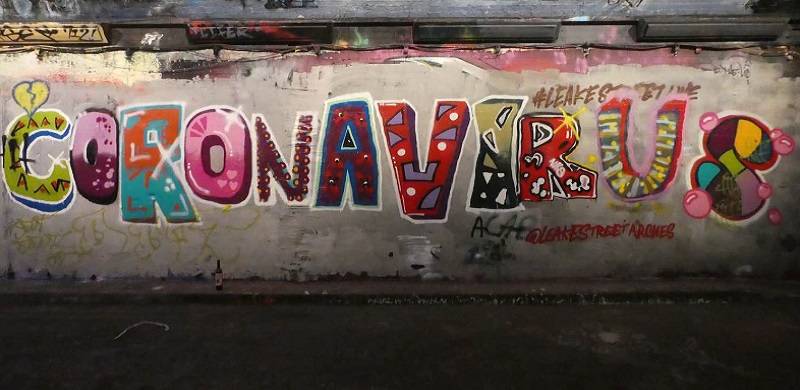
There’s a viral WhatsApp chain claiming your stomach acid will kill the novel Coronavirus if you drink enough water to swallow it down. You dutifully drink four litres of water per day.
A photo circulating on Facebook warns you that military helicopters will be flying overhead and spraying disinfectant onto houses. You shut your windows and latch your doors.
The President of the United States insists that hydroxychloroquine, a drug often used to treat malaria, is a real “game changer” for COVID-19 and has already garnered FDA approval. You take it. Potentially, you die.
Now, more than ever, misinformation is legion.
These half-truths and glaring falsities spread with untouchable speed and vigour, arguably more contagious than the virus itself. And they follow a distinct template. Someone knows someone who spoke to someone who works in the Guangdong Province of China and/or is the current Secretary of State. There’s precise, emphatic language that evokes fear or feeds into political aversions. There is never sufficient supporting evidence.
What is it that makes misinformation about the COVID-19 pandemic so compelling?
The answer may lie not in the contemporary age of rampant ‘fake news’, but in a deeper-rooted, longstanding undercurrent of tension between the Pakistani public and science itself.
A 2005 European Commission report found that many people could not answer basic scientific ‘true or false’ questions – with 43% of those quizzed believing that antibiotics kill viruses as well as bacteria, and 29% believing that the Sun orbits the Earth. It appears that a sizable proportion of the public lack an adequate understanding of science. One of most essential factors is 'critical thinking' or lack thereof among the educated circles, not to mention the illiterate.
We have weaponized both religion and patriotism to the extent that we don't endure opposition to our misguided view. Whereas patriotism was defined by deeds in the past, it is now driven by a cultish allegiance to songs, flags, symbols, mythologies and empty headed, often militaristic slogans. Thus minds are muddied with binary simplistic choices, and deduce conclusions fit their personal idiosyncrasies.
Some people of letters, too, either mythicized, rejected, or termed Covid-19 a plot by Israel or the United States. It's not the first time that this class has become prey to to its own fundamentalist views. Our educational system is at least partly to blame.
Disinformation and a hostility to scientific truths could prove a more serious threat to us than any virus.
In Ben Goldacre’s book Bad Science, there is a chapter titled “Why Clever People Believe Stupid Things” in which the British physician cites the phenomenon of “communal reinforcement” – when a claim becomes a strong belief through repeated assertion by multiple members of a community. The supposed realities talked about in every broadcast, press conference or social media chain e-mail settle in a stagnant state in the air around you; polluting.
All we can do is add the truth and hope that, at some point, it offsets the lies.
A photo circulating on Facebook warns you that military helicopters will be flying overhead and spraying disinfectant onto houses. You shut your windows and latch your doors.
The President of the United States insists that hydroxychloroquine, a drug often used to treat malaria, is a real “game changer” for COVID-19 and has already garnered FDA approval. You take it. Potentially, you die.
Now, more than ever, misinformation is legion.
These half-truths and glaring falsities spread with untouchable speed and vigour, arguably more contagious than the virus itself. And they follow a distinct template. Someone knows someone who spoke to someone who works in the Guangdong Province of China and/or is the current Secretary of State. There’s precise, emphatic language that evokes fear or feeds into political aversions. There is never sufficient supporting evidence.
What is it that makes misinformation about the COVID-19 pandemic so compelling?
The answer may lie not in the contemporary age of rampant ‘fake news’, but in a deeper-rooted, longstanding undercurrent of tension between the Pakistani public and science itself.
A 2005 European Commission report found that many people could not answer basic scientific ‘true or false’ questions – with 43% of those quizzed believing that antibiotics kill viruses as well as bacteria, and 29% believing that the Sun orbits the Earth. It appears that a sizable proportion of the public lack an adequate understanding of science. One of most essential factors is 'critical thinking' or lack thereof among the educated circles, not to mention the illiterate.
We have weaponized both religion and patriotism to the extent that we don't endure opposition to our misguided view. Whereas patriotism was defined by deeds in the past, it is now driven by a cultish allegiance to songs, flags, symbols, mythologies and empty headed, often militaristic slogans. Thus minds are muddied with binary simplistic choices, and deduce conclusions fit their personal idiosyncrasies.
Some people of letters, too, either mythicized, rejected, or termed Covid-19 a plot by Israel or the United States. It's not the first time that this class has become prey to to its own fundamentalist views. Our educational system is at least partly to blame.
Disinformation and a hostility to scientific truths could prove a more serious threat to us than any virus.
In Ben Goldacre’s book Bad Science, there is a chapter titled “Why Clever People Believe Stupid Things” in which the British physician cites the phenomenon of “communal reinforcement” – when a claim becomes a strong belief through repeated assertion by multiple members of a community. The supposed realities talked about in every broadcast, press conference or social media chain e-mail settle in a stagnant state in the air around you; polluting.
All we can do is add the truth and hope that, at some point, it offsets the lies.
